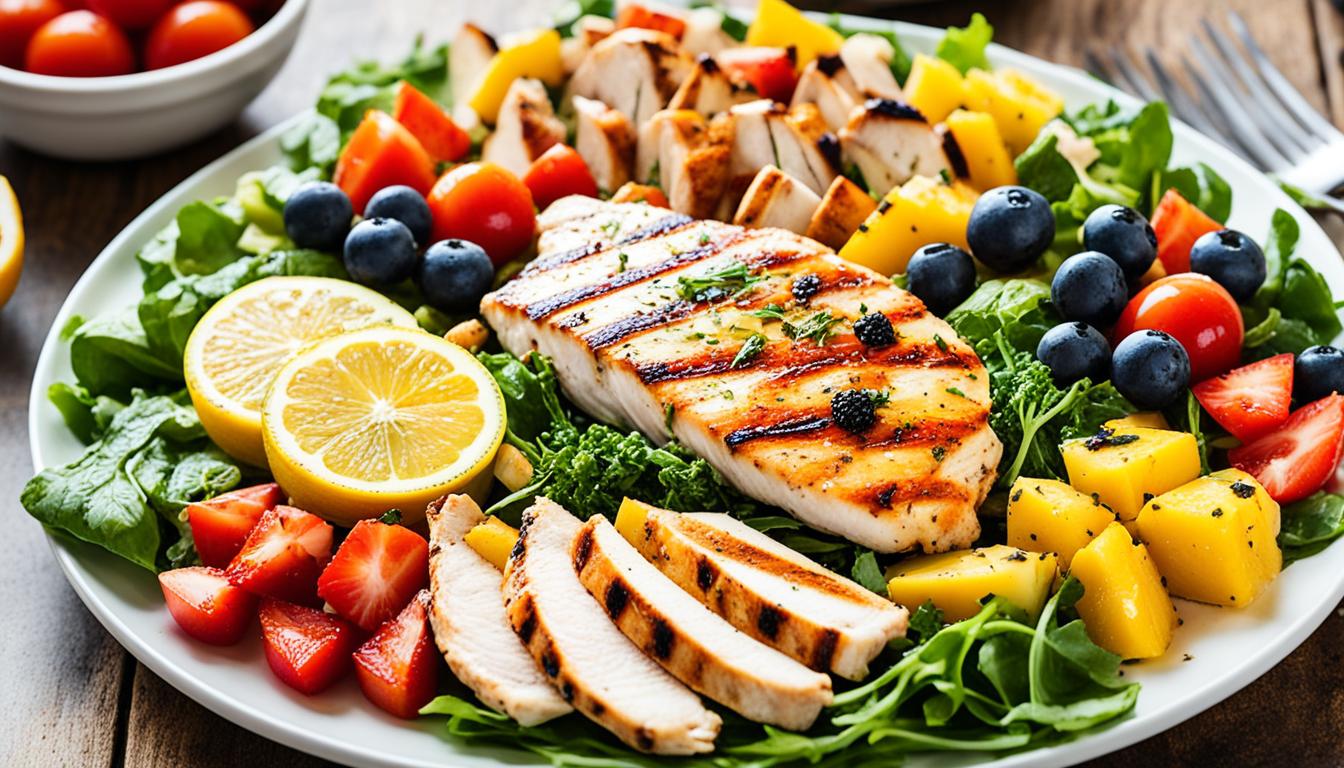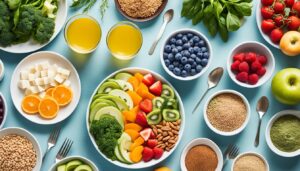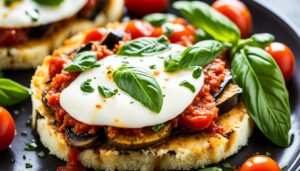Have you tried various diets but still feel hungry and low on energy? I know the struggle of finding a meal plan that is both nourishing and tasty. Let me share a great find: a high-protein, 1,500-calorie meal plan. It’s both filling and simple to make.
Protein is key for a healthy diet. It rebuilds our cells, boosts our immune system, and helps in losing weight. However, it’s hard to find a meal plan that’s rich in protein and still tastes good.
This meal plan removes the guessing game from your diet. It includes high-protein foods like salmon, chicken, edamame, eggs, and chickpeas. With each meal, you feed your body the essential nutrients it needs.
The plan provides more than enough protein and balances other vital nutrients. Meals include vegetables, fruits, whole grains, and healthy fats. This makes it a nutritious, high-protein diet that doesn’t cut out taste or satisfaction.
Plus, this meal plan is designed for convenience. It comes with tips for meal prep to simplify your life. Picture having your weekly meals ready ahead of time. With some preparation, you can enjoy delicious, high-protein meals without giving up time or taste.
If you want to start your weight loss or maintain a healthy lifestyle, try this high-protein, 1,500-calorie meal plan. It’s an easy, tasty, and fulfilling option for anyone.
Key Takeaways:
- This high-protein, 1,500-calorie meal plan offers a delicious and easy approach to weight loss and overall health.
- Protein is essential for building healthy cells and supporting the immune system.
- Each meal and snack in this meal plan is designed to provide well over the recommended daily protein intake.
- The meals are balanced with vegetables, fruits, whole grains, and healthy fats for optimal nutrition and satisfaction.
- Meal-prep tips are included to help you save time and make healthy eating more convenient.
The Importance of Protein in a Meal Plan
Protein is not just a nutrient that keeps us from feeling hungry. It plays a key role in our health, especially in repairing and building cells. It also supports our immune system and aids in weight loss.
Having protein in our meals and snacks makes us feel full longer. This stops us from eating too much, which is good for weight loss. Foods rich in protein like lean meats, eggs, dairy, and legumes help control our hunger. This leads to eating fewer calories during the day.
Protein is also important for keeping muscle mass and strength as we get older. Our bodies tend to lose muscle over time, but enough protein can slow this down. This keeps our muscles strong and lean.
But protein does more than just help with weight and muscle. It’s vital for a strong immune system too. By making antibodies and enzymes, protein fights off dangerous germs. This keeps our body safe and healthy.
It’s key to have enough protein in our diet for top health and to meet weight loss goals. Adding foods high in protein to our meals benefits us in many ways. It keeps us full, maintains our muscle, and protects us from sickness.
| Protein Benefits | Protein for Weight Loss | Protein and Immune System |
|---|---|---|
|
|
|
Daily Protein Recommendation
It’s vital to meet your daily protein needs for overall health and weight loss success. You should get at least 50 grams of protein each day. Our 1,500-calorie meal plan aims to exceed that, ensuring you get enough protein.
Every meal and snack includes foods high in protein. This helps you meet or exceed your protein needs. Adding different protein sources to your meals gives your body what it needs for repair, immune health, and a strong metabolism.
“Protein is a critical nutrient that is involved in an array of essential functions within the body. It plays a vital role in repairing and building cells, supporting the immune system, and aiding in weight management.”
Following this meal plan can aid weight loss or boost overall health. Key protein sources include lean meats, poultry, fish, eggs, dairy, legumes, and nuts. They help you feel full longer, support muscle recovery, and improve immune health.
The Importance of Daily Protein Intake
Protein is crucial not just for managing weight and muscle growth but also for immune support. Adequate protein strengthens your immune response, helping fight infections and diseases.
Protein aids in keeping a healthy weight too. High-protein meals increase fullness and cut cravings. This makes it easier to maintain your calorie goals and limits overeating.
| Protein-Rich Foods | Protein Content (per serving) |
|---|---|
| Chicken breast | 27 grams |
| Sockeye salmon | 22 grams |
| Black beans | 15 grams |
| Greek yogurt | 17 grams |
| Quinoa | 8 grams |
Knowing the daily protein recommendation and meeting it is key to optimal health and weight loss. Add protein-rich foods to your diet. For personalized advice, talk to a healthcare professional or a dietitian.
Building a Balanced Meal Plan
To achieve a healthy meal plan, it’s important to mix different food groups. This balance gives your body the nutrients it needs. It also helps with weight loss. Include high-protein foods, veggies, fruits, whole grains, and healthy fats in your 1,500-calorie plan.
High-protein Foods:
Protein-rich foods like salmon, chicken, edamame, eggs, and chickpeas are great. They keep you full and help muscles recover and grow.
Vegetables and Fruits:
Add a lot of colorful veggies and fruits to your meals. They are full of vitamins, minerals, and fiber, vital for good health.
Whole Grains:
Choose whole grains such as quinoa, brown rice, and whole wheat bread. They give lasting energy and are rich in fiber. This helps with digestion and keeps cravings away.
Healthy Fats:
Add healthy fats from avocados, olive oil, nuts, and seeds to your meals. These fats support the brain, hormone production, and make you feel full.
Tip: Try mixing these food groups for tasty, fulfilling meals. For instance, have grilled chicken with roasted veggies. Or enjoy a salad with chickpeas and olive oil drizzle.
Meal-Prep Tips for Convenience
Sticking with a healthy eating plan needs convenience. Meal prep is a game-changer for this reason. By preparing meals ahead, you save time and always have nutritious options ready.
Some meal-prep tips will help your 1,500-calorie meal plan:
1. Make-Ahead Meals:
Batch meals are a meal prep lifesaver. For example, make a Chicken Quinoa Bowl with Olives & Cucumber in advance. Divide it into portions for the week. This saves time and gives you a quick, protein-filled meal.
2. Hard-Boiled Eggs:
Hard-boiling eggs is a smart move. These protein-packed snacks are great for breakfast or as a snack. Enjoy them alone, in salads, or make an egg salad. They’re a handy protein source.
3. Double Batch and Freeze:
Try doubling your Easy Brown Rice or similar grains. Portion some for meals and freeze the rest. Reheat when needed, saving time and effort.
Meal prepping keeps you on your 1,500-calorie plan, saves money, and cuts food waste. It helps avoid unhealthy fast food and ensures a balanced diet. It makes sure you eat a good mix of protein, whole grains, and veggies.
Learn these meal-prep tips for a sample meal plan that’s convenient and tasty.
Benefits of Meal Prep
Meal prep isn’t just convenient. It has many benefits for your meal routine:
| Benefits of Meal Prep |
|---|
| 1. Saves time during the week |
| 2. Reduces the temptation for unhealthy takeout |
| 3. Helps you stick to your calorie and nutritional goals |
| 4. Reduces food waste |
| 5. Saves money by minimizing food purchases |
| 6. Provides a variety of nutritious meals |
| 7. Allows for portion control |
| 8. Ensures a balance of protein, carbohydrates, and fats |
Sample Meal Plan for 1,500 Calories and High Protein
If you’re aiming for a high-protein diet within 1,500 calories, you’re in the right place. Our sample meal plan is tasty, healthy, and full of protein. It helps you meet your protein needs and supports weight loss.
Breakfast
Begin your day with a breakfast that’s rich in protein:
- 2 scrambled eggs with spinach and cherry tomatoes
- 1 slice of whole grain toast with avocado
- 1 cup of Greek yogurt topped with fresh berries
Lunch
Maintain your energy with a nutritious lunch:
- Grilled chicken breast salad with mixed greens, cucumbers, and bell peppers
- 1/2 cup of quinoa
- 1 tablespoon of balsamic vinaigrette
Dinner
End your day with a dinner that’s both tasty and protein-packed:
- Baked salmon with lemon and dill
- 1 cup of roasted Brussels sprouts
- 1/2 cup of brown rice
Snacks
Stay full with these protein-rich snacks:
- 1 hard-boiled egg
- 1 small apple with 1 tablespoon of almond butter
- 1/4 cup of roasted chickpeas
Feel free to change the meal plan to fit what you like and need. Always check with a health professional or dietitian before changing your diet significantly.
Nutritional Information and Total Daily Values
Every day, the sample meal plan shows key nutrition facts. It includes calories, protein, carbs, fiber, fat, and sodium levels. This gives you a full view of what you’re eating each day.
| Meal | Calories | Protein (g) | Carbohydrates (g) | Fiber (g) | Fat (g) | Sodium (mg) |
|---|---|---|---|---|---|---|
| Breakfast | 350 | 20 | 45 | 7 | 10 | 350 |
| Morning Snack | 150 | 8 | 20 | 3 | 5 | 200 |
| Lunch | 400 | 25 | 40 | 8 | 15 | 400 |
| Afternoon Snack | 200 | 10 | 25 | 5 | 6 | 250 |
| Dinner | 400 | 30 | 35 | 6 | 15 | 500 |
| Evening Snack | 200 | 10 | 20 | 4 | 8 | 300 |
The calories are kept around 1,500 to help with weight loss. Plus, you get more than enough protein each day.
Benefits of a High-Protein, Low-Calorie Diet
Starting a high-protein, low-calorie diet offers many benefits for weight loss and health. This diet helps you reach your goals. It makes you feel good from the inside out.
Boosted Metabolism
A big plus of this diet is faster metabolism. Foods rich in protein take more energy to break down. This means you burn more calories digesting them. Your body keeps burning calories all day, aiding in weight loss.
Reduced Appetite
This diet is great for keeping hunger at bay. Protein makes you feel full and cuts down on cravings. Eating plenty of protein means you stay full longer, stick to your calorie limit, and avoid extra snacks.
Promotes Fat Burning
This diet encourages your body to burn fat. Protein keeps muscle mass up, which is key for fat burning. Eating enough protein while cutting calories helps your body turn stored fat into energy. This leads to weight loss.
“A high-protein, low-calorie diet can be a powerful tool for weight loss as it boosts metabolism, reduces appetite, and promotes fat burning.”
Nutrient-Dense Foods for Overall Well-being
The diet includes foods that are full of nutrients. These foods give you proteins, vitamins, and minerals for health. Eating these foods boosts your immune system and keeps you healthy.
Improved Body Composition
Keeping muscle mass is key when losing weight. This diet helps with that balance. It includes foods rich in protein to repair and keep muscle tissue. This leads to fat loss and keeps muscle mass.
A high-protein, low-calorie diet brings big benefits for weight loss and health. It ramps up metabolism, cuts hunger, burns fat, fills you with nutrients, and keeps muscles strong. Following this diet can help you reach your weight loss goals and boost your health.
Potential Risks of a High-Protein Diet
A high-protein diet helps with weight loss and improves health. But, it’s vital to know the risks. Too much protein can strain your kidneys and liver. This is especially true if you already have kidney or liver issues. Always balance your nutrients and get medical advice before starting any new diet.
“Consuming too much protein can put strain on the kidneys and liver.”
High-protein diets require careful kidney health monitoring. The kidneys filter waste and excess fluids from our blood. A lot of protein puts more work on them. This can harm your kidneys or worsen existing conditions. It’s important to balance your intake of proteins, carbs, and fats for kidney health.
It’s also necessary to watch your nutrients. Eating enough protein is key, but so are carbs and fats. They give you energy and vital nutrients. A good meal plan includes different foods from all groups.
Moderation and medical advice can reduce high-protein diet risks. Find the right balance of benefits and risks. This helps in making wise food choices. It also boosts your health and happiness.
Conclusion
A high-protein, low-calorie meal plan is smart and effective for weight loss goals. It includes foods like salmon, chicken, and edamame. You also eat a lot of fruits, veggies, whole grains, and healthy fats. This makes the 1,500-calorie plan balanced and full of nutrients.
To ensure safety and success, follow the guidelines and talk with a healthcare provider. Everyone’s needs are different, so get advice tailored to you. With hard work, commitment, and the right help, reaching your weight loss goals is possible. This plan gives your body what it needs to be healthy.
But remember, this meal plan is just part of the solution. To stay healthy, add in exercise, drink plenty of water, and manage stress. Making these small, lasting changes helps you succeed over time. You’ll feel better and live a healthier life.





